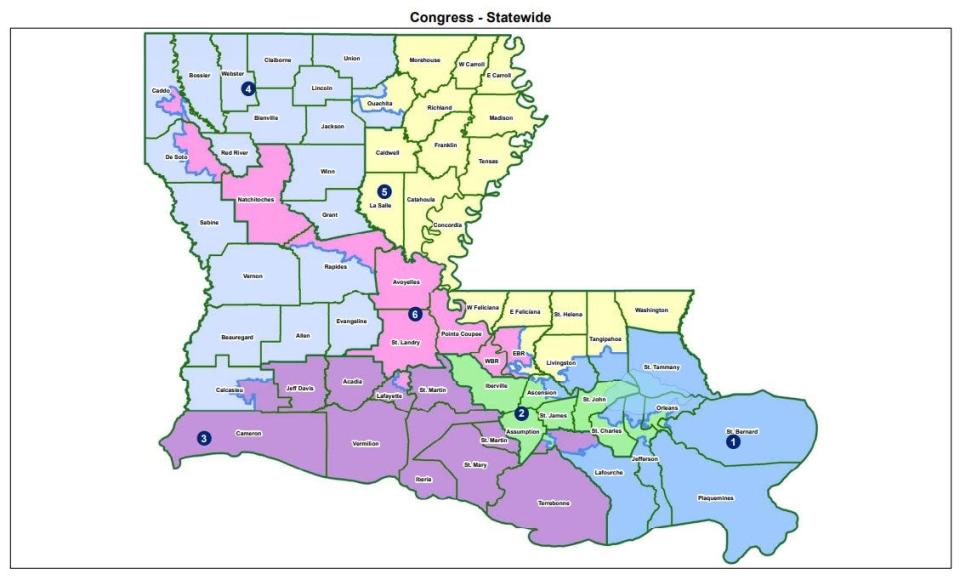Supreme Court allows Louisiana's congressional map with new, mostly Black district
WASHINGTON – The Supreme Court on Wednesday cleared the way for Louisiana to use a congressional map with a second majority Black district, a move that has implications for which party wins control of Congress after the November elections.
The court’s decision, made in a response to an emergency request from state officials and voting rights advocates, is the latest twist in a yearslong battle over the boundaries of the state's six congressional districts involving the interplay of race, politics and redistricting.
"Louisiana will finally have a fair and equitable map," said Jared Evans, an attorney with the NAACP Legal Defense Fund.
The Supreme Court put on hold a lower court's ruling invalidating a map that increased the number of mostly Black districts from one to two.
Louisiana Attorney General Liz Murrill said the court’s intervention gives stability to the state’s election process, which had fast-approaching deadlines.
Lawyers for the Louisiana voters who challenged the map called it a “brutal racial gerrymander” that they’re confident will ultimately by struck down by the Supreme Court in future proceedings.
Southern states have struggled to find what Chief Justice John Roberts called, in a 2014 case involving Alabama, “the sweet spot” on the use of race in redistricting to comply with a 1965 civil rights law. The goal is to do it in a way that doesn’t lead to unconstitutional racial gerrymandering.
Richard Pildes, a constitutional law professor at New York University School of Law who argued the 2014 case involving Alabama, called the Louisiana case “the biggest procedural train wreck” involving the Voting Rights Act that he can remember.
The power of Black voters diluted by a new map?
A federal court said in 2022 that the power of Black voters was diluted under a map the Louisiana legislature created with only one mostly Black district ? despite the fact that Black people represent about one-third of the population.
But when the GOP-controlled legislature created a map with two majority Black districts – one of which crosses the state diagonally ? a divided panel of federal judges sided with a group of self-described “non-African American” voters who argued it was unconstitutional because voters’ race was the main consideration.
'Morally repugnant'
Calling the map “morally repugnant,” the challengers told the Supreme Court it doesn’t meet traditional redistricting principles like covering compact areas of towns of communities with similar interests instead of having a district that zigs and zags.

State officials said that, beyond trying not to run afoul of the Voting Rights Act, lawmakers chose boundaries that protected powerful incumbents – House Speaker Mike Johnson, Majority Leader Steve Scalise and Rep. Julia Letlow, who serves on the House panel that writes spending bills.
The judges gave the state until June 3 to try again before imposing its own map.
'This madness must end'
Louisiana officials told the Supreme Court district boundaries needed to be settled by May 15 to meet deadlines for candidate filings and other election preparations.
“This madness must end,” Murrill, the state's attorney general, told the court when pleading for intervention.
If the state doesn’t have a map by May 15, Murrill said, the only way to avoid “election chaos” is to revert to the initial map with one majority Black district which is still programmed into Louisiana’s voter-registration system.
The NAACP Legal Defense Fund said Black voters in Louisiana already lost representation when the maps were not settled in time for the 2022 election and that harm should not be repeated.
This article originally appeared on USA TODAY: Supreme Court allows second majority Black House district in Louisiana
